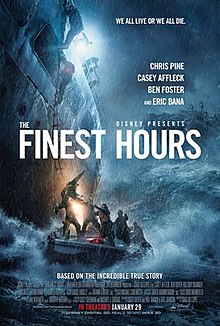| The Finest Hours | |
|---|---|
 |
by Peter J. O’Connell
The Finest Hours. Released:
Jan. 2016. Runtime: 117 mins. MPAA Rating: PG-13 for intense sequences of
peril.
Britain’s “finest hour,” according to Winston Churchill, was
the Royal Air Force’s heroic, eventually victorious, struggle in the skies
against Hitler’s Luftwaffe in the grim summer of 1940. Some have called a
heroic mass rescue effort on stormy seas in the fierce winter of 1952 the U.S.
Coast Guard’s “finest hours.” Now a film with that sobriquet as its title has
made it to local screens.
The Finest Hours,
directed by Craig Gillespie, has three interweaving plot lines. One involves
the desperate efforts to keep the stern half of an oil tanker afloat after the
ship splits in two during the nor’easter off New England in February 1952. The
bow half of the ship sinks, costing many lives, including that of the captain.
Engineer Ray Sybert (Casey Affleck) takes charge of the stern half and devises
a plan to keep that half afloat until a rescue boat can arrive from the Coast
Guard station in the small town of Chatham on Cape Cod.
At the Coast Guard station, the commanding officer, Dan
Cluff (Eric Bana), dispatches young Bernie Webber (Chris Pine), assisted by
Dick Livesey (Ben Foster) and two other men, in a small craft to attempt to
rescue the men on the tanker half. By this time the storm has become truly
hellacious, with waves as high as 70 feet. Furthermore, Bernie is plagued by
self-doubts stemming from his failure to succeed in a rescue attempt several
months earlier. Dick Livesey, however, a seasoned salt, provides Bernie with
much needed skill and support. That skill and support—and more—are needed, for
the Coast Guard craft has a stated capacity far fewer than the number of
survivors on the tanker, and, to add to the nightmarish situation, the Coast
Guard craft has lost its compass, which seems an obvious necessity for getting
back to shore.
The movie’s third plot line involves the efforts of Miriam
Pentinnen (Holliday Grainger), Bernie’s fiancée, first to persuade Dan Cluff to
call back Bernie’s boat—she is unsuccessful—and then to develop a plan to
assist with the rescue attempt from shore.
The Finest Hours
has many fine moments in it. The CGI (computer-generated imagery) of the storm
and the ships is gasp-inducing but not (too) unrealistic. The score by Carter
Burwell is also excellent, stirring without being bombastic a la John Williams.
As far as the acting goes, Casey Affleck’s performance is as laserlike in its
intensity as his character’s focus is in Ray Sybert’s efforts to keep the
tanker half afloat.
Unfortunately, the film’s overall effect is weakened by the
performances of: Pine, who seems more constipated than conflicted; Bana, who,
as a Southerner in command of a New England post in a crisis, is supposed to be
a somewhat confused character but actually comes across as an actor confused
about how to portray his character; and Grainger, who seems more of a
flibbertigibbet than a heroine.
Nonetheless, the CGI, the score, and Affleck’s performance
make the movie well worth seeing and a well-deserved tribute to one of
America’s services that does not get as much attention as it should for its
efforts to provide protection for humans and nature along thousands of miles of
coastline, in all kinds of conditions.
“Footnote” to the
film: A number of films released in recent months seem, as it were, to pair
up because of overarching themes that connect them. For example, 13 Hours: The Secret Soldiers of Benghazi and The Finest Hours both celebrate patriotism and heroism in a crisis.
And The Finest Hours and In the Heart of the Sea are fact-based
maritime tales.
No comments:
Post a Comment